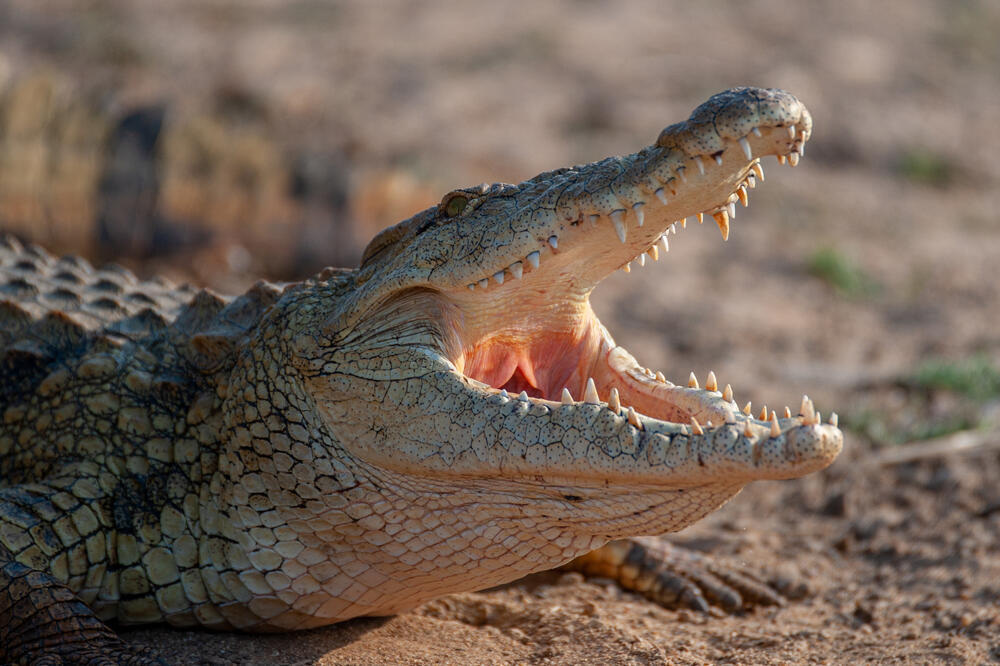In a recently published study, Nile crocodiles exhibited a distinct reaction to different distress sounds emitted by both young chimpanzee species and human infants, played through loudspeakers. As the volume escalated, the bioacoustics researchers from the University of Saint Etienne and the University of Lyon in France, found that crocodiles perceived heightened distress, leading to more frequent and aggressive responses.
Read more:
The Nile crocodile (Crocodylus niloticus) is a sizable crocodilian native to African freshwater habitats across 26 countries. Predominantly distributed in sub-Saharan Africa, it thrives in various aquatic landscapes—lakes, rivers, swamps, and marshlands. While it can tolerate saline settings, it primarily dwells in freshwater, with occasional presence in deltas and brackish lakes. Historically, its range extended to the Nile Delta. Adult males generally measure 3.5 to 5 m (11'6" to 16'5") and weigh 225 to 750 kg (500 to 1,650 lb), yet specimens exceeding 6.1 m (20 feet) and 1,000 kg (2,200 lb) have been documented.
The study that was published in Proceedings of the Royal Society B: Biological Sciences peer-reviewed journal, researchers scrutinizes the reactions of crocodiles to recordings of infants crying. These sonic cues were introduced at CrocoParc, located in the southwestern Moroccan city of Agadir—a unique haven for crocodiles in the nation. where 325 Nile crocodiles are housed
Earlier research revealed that crocs heighten their vigilance upon hearing distress sounds from potential prey. This often prompts them to approach the sound's origin, anticipating an effortless meal. In the recent study undertaken in Morocco, a fresh query emerged: would crocodiles respond similarly to primate distress sounds, even though primates do not typically find themselves to be part of the crocodile's menu?
In pursuit of answers, researchers compiled an array of audio recordings capturing cries and distress calls. This comprehensive assortment encompassed sounds emitted by a common chimpanzee, a Bonobo (type of chimp), and human infants at varying levels of intensity. The human recordings spanned the cries of babies and toddlers, aged 4 and under, resonating within the confines of home settings as well as during vaccination procedures.
The researchers embarked on a field expedition to CrocoParc in Morocco, renowned for its extensive crocodile population. This zoological haven employs an unconventional approach, granting crocodiles the liberty to roam across the park's expanse. This freedom aims to replicate an environment akin to their natural habitat. Strategically situating speakers throughout the park, the researchers initiated the playback of the recording sequence, meticulously observing the ensuing responses of the apex predators.
They noticed that the Nile crocodiles showed a strong attraction to the cries of highly distressed babies. The crocodiles' reactions intensified as the crying and stress levels increased, resembling their prey's moments of greatest vulnerability.
Although exact gender-specific response breakdowns were not documented, both male and female crocodiles displayed analogous behavior. They either turned their heads or approached the origin of the crying sounds, with some even going as far as biting the speakers.
Additionally, the researchers uncovered that the significant crocodiles' reactions hinged on the volume of the sounds they encountered. Approximately one-fifth of the creatures reacted to recordings of human infants in minor distress, while roughly one-third responded to recordings of infants facing substantial distress.
"Our experiments obviously do not mean that crocodiles cannot be attracted by other signals than distress calls – they are opportunistic hunters," the authors of the study note, "but they suggest that the readiness of these animals to react increases with the presence of acoustic features marking a level of distress."



